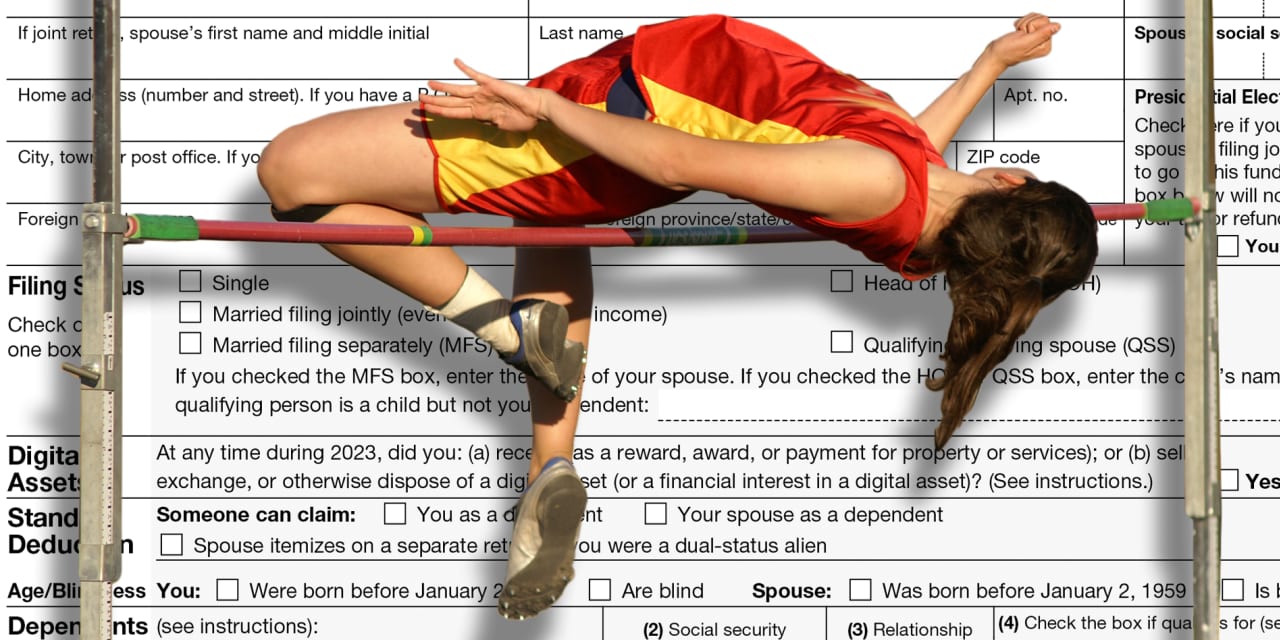Do you have information on helping student-athletes like me with filing taxes this year? Especially for those receiving money from their name image and likeness.
Young athletes know the acronyms tied to their sport: NCAA, NBA, NHL, NFL, MLS and MLB.
Put the IRS on that list.
It’s been less than three years since the National Collegiate Athletic Association said student-athletes could be compensated for the use of their name, image and likeness. That could mean marketing deals, product endorsements, promotional appearances, and much more. The NCAA made the change following a landmark Supreme Court decision in 2021.
There has been a lot of attention on the implications of NIL deals ever since. Some speculate it’s one reason why University of Alabama coach Nick Saban recently shocked the college football world by retiring with six years and $71.8 million still to go on his contract.
What’s received less attention are the taxes inhabiting this brave new world of college sports.
“One of the biggest areas that I don’t think is talked about is taxation,” said Robert Raiola, a director at the Sports and Entertainment Group within PKF O’Connor Davies Advisory.
He’s helped college athletes with NIL deals. Until he explains, it’s common they don’t know taxes will apply, Raiola said.
The IRS’ ombudsman, the Taxpayer Advocate Service, set up an online resource last year to help athletes and their families understand the tax obligation with NIL deals.
Rule number one from the IRS resource: “Any income from NIL activities, including non-cash, is considered taxable income.”
It’s game time — starting Jan. 29. That’s when the IRS starts accepting and processing 2023 income tax returns. Here are some highlights:
A number to watch: 1099
In the eyes of the taxman, student-athletes getting money in NIL deals are independent contractors and not employees, said Raiola, co-author of the book “Winning Tax Strategies for Athletes & Entertainers.”
The compensation to independent contractors is documented in 1099 forms, he said. Paid by a memorabilia collector for your autograph? Expect a 1099-NEC. Paid to endorse clothing, make a promotional appearance or something else? Expect a 1099-NEC.
The NEC stands for Nonemployee Compensation. The payment threshold that prompts this tax form is payment worth at least $600, Raiola noted.
The tax-time schooling of college athletes will be “greatly enhanced when they get a nice 1099-NEC in their mail. That’s where the education process is going to start,” said Ryan Losi, executive vice president of the accounting firm Piascik. His job includes tax work for league-based and non league-based professional athletes.
Suppose you’ve been paid via Venmo or PayPal.
PYPL,
That’s when you can expect a 1099-K. For this year, the IRS is planning for a $5,000 threshold to trigger the form.
These 1099s flag to you how much you’ve been compensated. The forms also go to the IRS, so they also know you’re profiting off your talents and they’ll expect their cut too.
Specifically, they want your money for income taxes and self-employment taxes. When wage workers get a paycheck, payroll taxes are skimmed off the top and go towards Medicare and Social Security.
A student athlete is the same as others receiving independent contractor money. They are expected to pay the employee and the employer side of those payroll taxes, which come to 15.3%. At tax time, the IRS says people can deduct the employer-equivalent that they’ve paid.
Until then, the IRS is expecting quarterly estimated tax payments.
For this year, first quarter payments are due April 15, and second quarter payments are due on June 17. Third quarter payments are due on Sept. 16 and fourth quarter payments are due Jan. 15, 2025.
Two other notes: Don’t forget the likelihood of state income taxes from the pay on NIL deals. Also, compensation doesn’t have to mean cash in your bank account.
The payout in certain NIL deals might be a vehicle, a trip, equipment, cryptocurrency and more, Losi said. “It’s non-cash compensation, but it’s taxable. The question is, do you know the fair value?”
Business expenses
NIL deals enable athletes to turn their talents into a business. That being the case, they have business expenses eligible for write offs, experts say.
Paying a trainer, renting gym space and certain travel costs could be eligible. So could the cost of professional advice from lawyers, tax experts and others.
Of course, hang onto the receipts for all of this.
Business expenses tied with the NIL deal can reduce tax burdens. Raiola and Losi said student-athletes becoming flush with money can trim their tax bills by setting up solo 401(K) plans or Simplified Employee Pension plans known as SEPs.
It’s never too early to save for retirement, after all.
While we’re talking school, money and taxes, a note on scholarships.
Scholarship money is tax exempt, but the IRS has rules. The person has to be seeking a degree at an “educational institution that maintains a regular faculty and curriculum, and normally has a regularly enrolled body of students in attendance at the place where it carries on its educational activities.”
The money has to be used “to pay for tuition and fees required for enrollment or attendance at the educational institution, or for fees, books, supplies, and equipment required for courses at the educational institution,” the IRS said.
Any amount that goes towards “incidental expenses, such as room and board, travel” must be included in gross income, the IRS added.
Next move?
Strip away the sports talk — and there’s nothing new about the tax obligations at play here, Losi and Raiola said.
If nothing else, pay the quarterly taxes, hold onto receipts and all tax forms. File a return by April 15 or get an extension to file one by Oct. 15. No one wants failure to pay or failure to file penalties from the IRS.
In my teens and 20s, I certainly wasn’t thinking about business write-off intricacies and self-employment taxes. And, trust me, I had no lucrative athletic deals in the works!
That’s why it might be a good call to find a trusted tax professional to help. “You gotta have somebody who knows what they are doing in this space,” Raiola said.
The IRS is a referee you definitely don’t want to annoy.
Read the full article here





